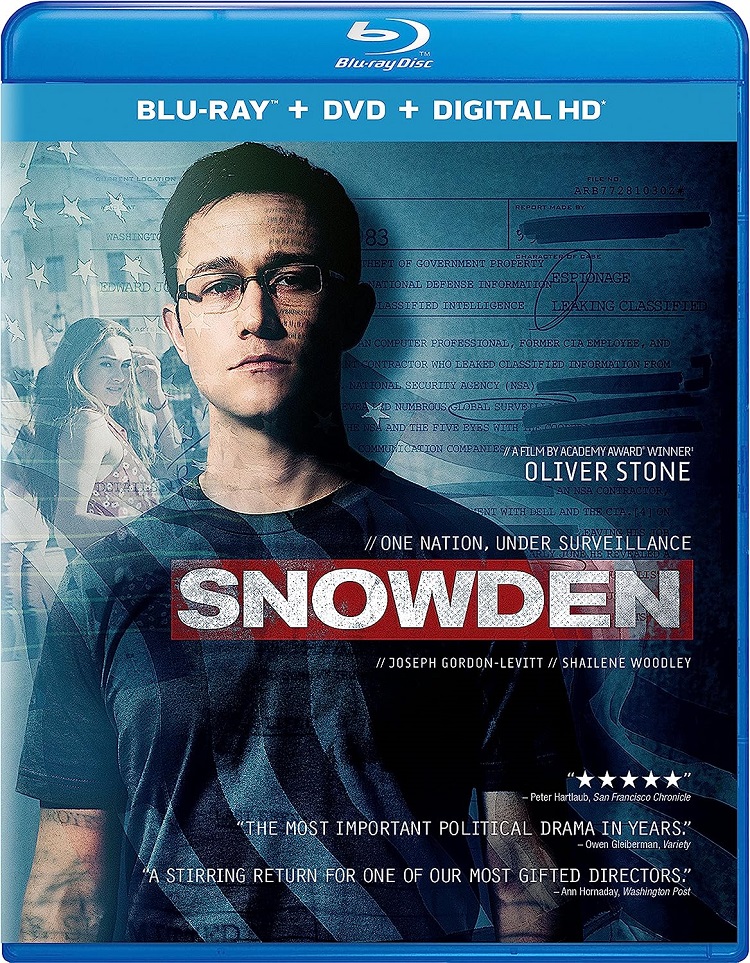
Written by Glen Boyd
Oliver Stone has a well-documented history of adapting real-life historical events into films that often thread a finely woven, but shadowy web of conspiracy and paranoia that dares the audience to question what is actually real and what is more likely theatrically imagined. In movies like JFK and Nixon, Stone has also occasionally displayed a tendency to play somewhat loose with the factual record, perhaps most notably with his – how shall we say? – “interesting” recounting of the Jim Morrison story in The Doors, parts of which were openly disputed by the surviving band members themselves.
With Edward Snowden, you would think that Stone would have found the perfect vehicle to push that particular envelope to the very limits of dramatic license. Instead, Stone plays it fairly straight with his latest political docu-drama Snowden. This is most likely because the truth of the story itself – the idea that the United States government would be this much invested in spying on its own citizens – is so much stranger than any fiction some garden variety conspiracy theorist could ever cook up on some internet blog posted from his parents basement.
 The performances in the film – led by Joseph Gordon Levitt’s spot-on portrayal of Snowden himself (Levitt nails Snowden’s geeky mannerisms right down to his flat-sounding vocal monotone), but also including fine work from Zachary Quinto, Timothy Olyphant, Melissa Leo, Shaliene Woodley, and even a surprising Nicholas Cage (playing well outside of his usual stereotype ) – are much more subtle, subdued, and nuanced than you ever might expect, given both this director and the controversial, politically-charged subject matter.
The performances in the film – led by Joseph Gordon Levitt’s spot-on portrayal of Snowden himself (Levitt nails Snowden’s geeky mannerisms right down to his flat-sounding vocal monotone), but also including fine work from Zachary Quinto, Timothy Olyphant, Melissa Leo, Shaliene Woodley, and even a surprising Nicholas Cage (playing well outside of his usual stereotype ) – are much more subtle, subdued, and nuanced than you ever might expect, given both this director and the controversial, politically-charged subject matter.
Still, there’s no escaping the strong undercurrent of paranoia running throughout Snowden. Webcams are covered with tape to keep Big Brother from watching. At one point, the gigantic, dystopian image of Snowden’s one-time CIA handler Corbin O’Brian (played to diabolical perfection by Rhys Ifans in the one performance that comes closest to being a bit over-the-top) covers the entire wall of an interrogation room, demanding Snowden to “look at me” while informing him that both he and his girlfriend are being surveilled.
What Stone does most effectively with Snowden though, is address the moral ambiguities of the character himself. Whether you believe Snowden was a hero (as Stone clearly does) or the traitor who risked our national security, most often cited by detractors (including presidents both past, present and soon-to-become), his sincerity and determination are never really put to question here. The decision to leak documents that exposed the innermost secrets of the domestic spying programs he learned about (and even helped develop) while working on highly classified projects for both the CIA and the NSA, also came at considerable risk, both professional and personal, to Snowden himself. While he was able to effectively clear some of those hurdles, including some serious health issues and the near-loss of his relationship with obvious soulmate Lindsay Mills (played here in another surprisingly poignant turn by Shaliene Woodley), Snowden is also to the present day a man without a country, living a life of exile somewhere in Russia.
But as the character study Oliver Stone’s Snowden ultimately is, Levitt’s performance is the most fascinating and fun thing to watch. Levitt transforms Snowden’s character from the brilliant, yet socially awkward, geeky conservative too shy to make the first move with his hot new liberal girlfriend, into the righteous moral crusader who finds the courage to act on his convictions by taking on his own country (despite the consequences sure to follow), while barely breaking a sweat doing so.
The DVD/Blu-ray double disc edition of Snowden also comes with a free digital download that is more trouble than it is worth, unless you have both the time and patience for the iTunes installation required to watch it on your smartphone or tablet. The extras however are less cumbersome and far more worth exploring. These include both deleted scenes from the movie and an interview before a live audience with Stone, Levitt, Woodley, and Edward Snowden himself (seen via live internet connection coming from an undisclosed location, most likely somewhere in – you guessed it – Russia).